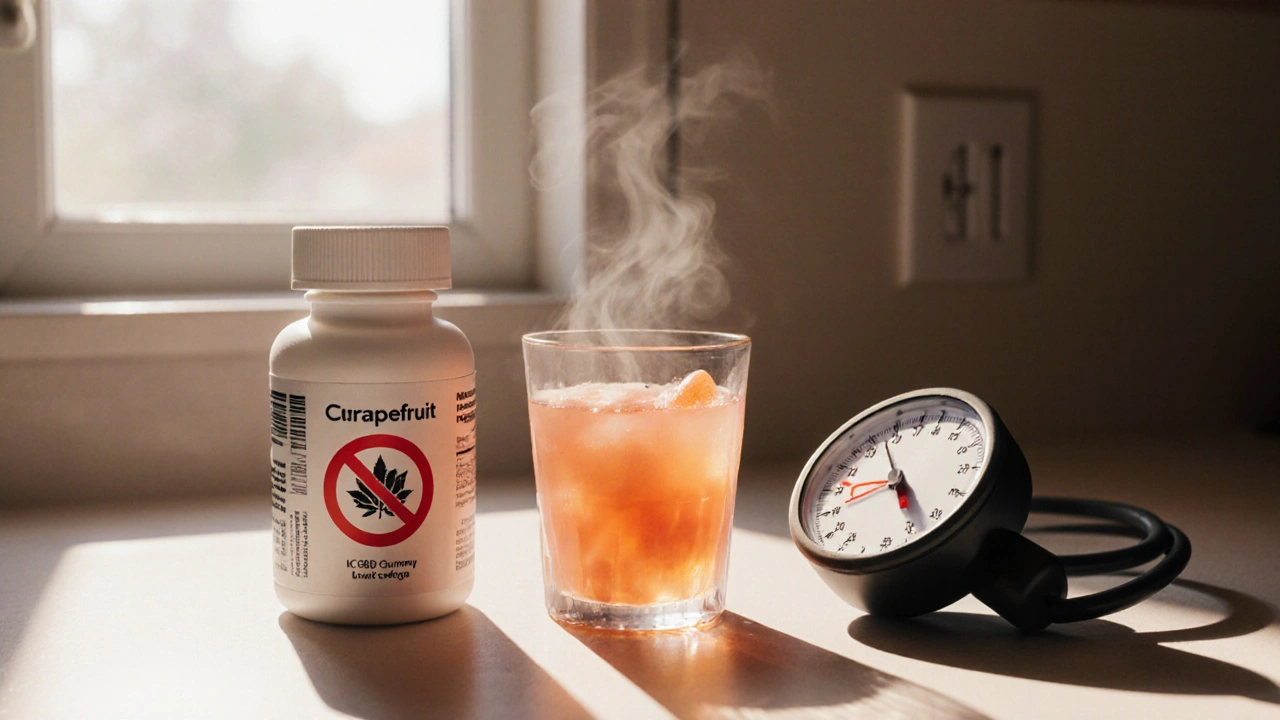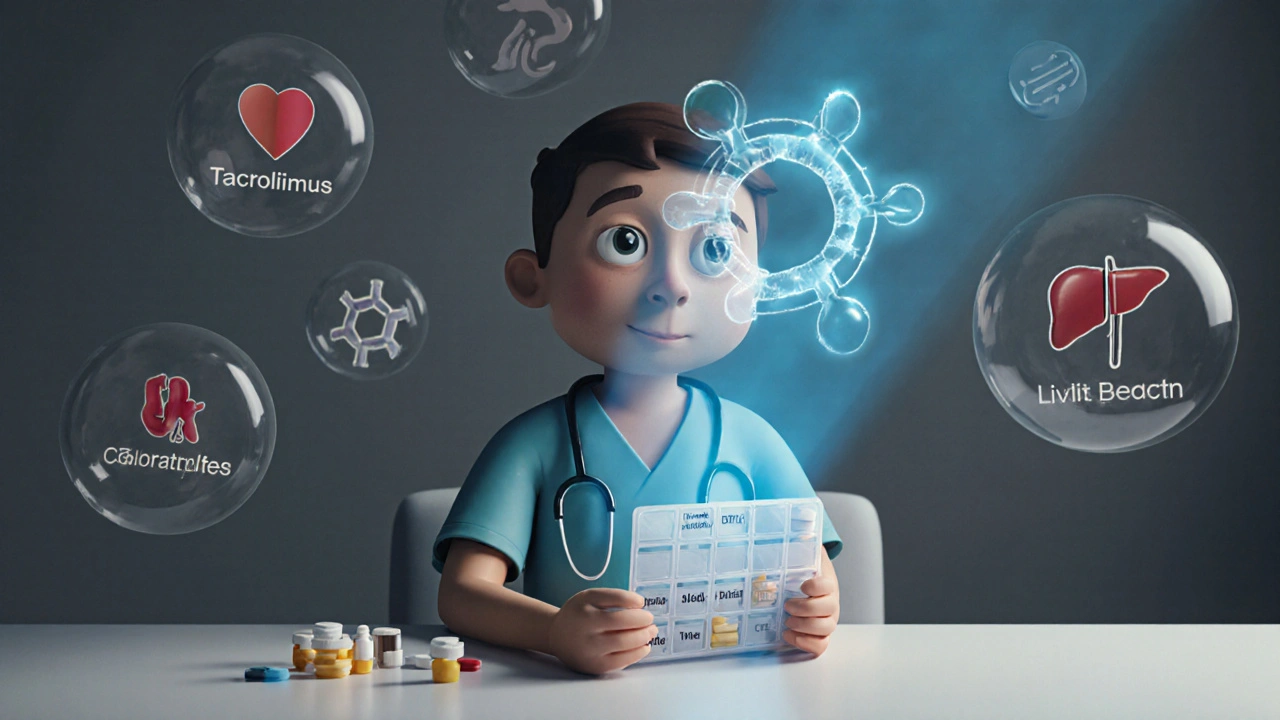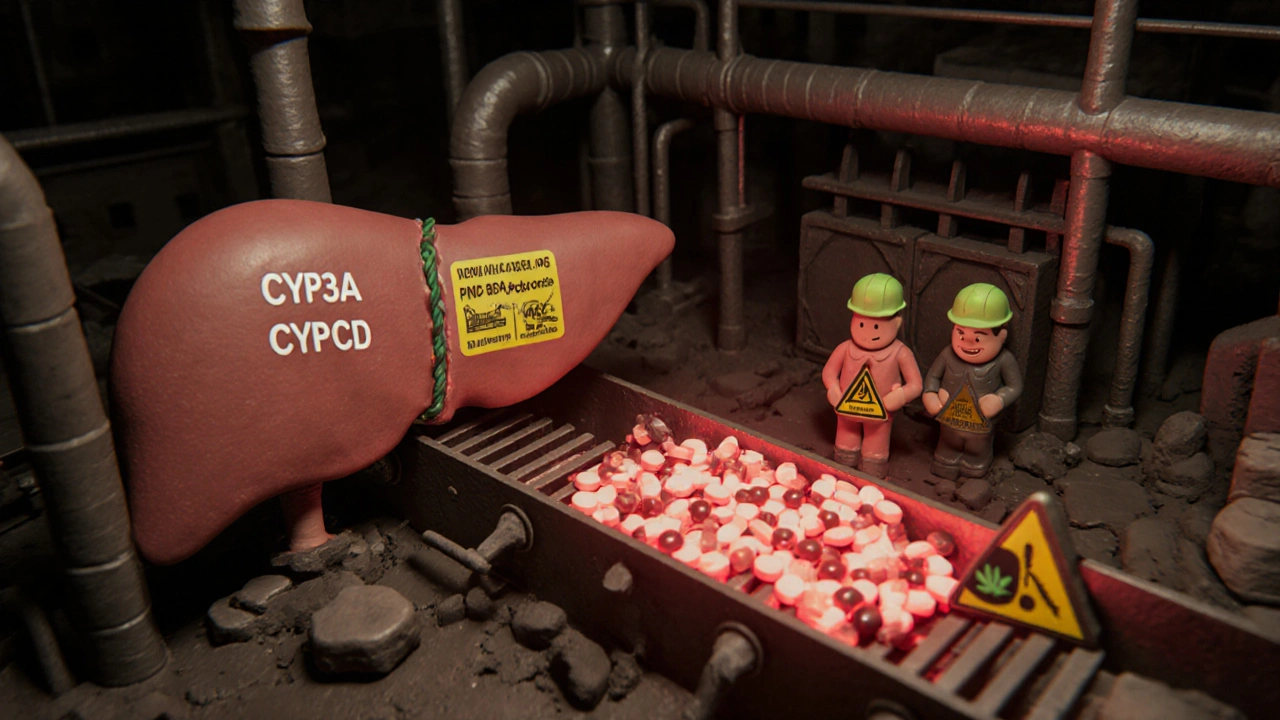More people are trying CBD for sleep, anxiety, or pain - but if you're on prescription meds, you could be putting yourself at risk. It's not just about what CBD does - it's about what it does to the drugs you're already taking. The truth is, CBD can mess with how your body processes medications in ways that are serious, sometimes life-threatening. And most people have no idea.
How CBD Interferes With Your Medications
Your liver uses a system called the cytochrome P450 (CYP450) to break down about 95% of all prescription drugs. Think of it like a factory assembly line. Each drug has its own lane, and enzymes like CYP3A4 and CYP2C19 are the workers that process them. CBD doesn’t just use that factory - it shuts down the workers. It blocks those enzymes, so your meds don’t get broken down the way they should. This means drugs can build up in your system to dangerous levels. If you're taking blood thinners like warfarin, for example, even a small amount of CBD can cause your blood to thin too much. That’s not theoretical - seven documented cases show patients needed urgent dose changes after starting CBD. Two of them bled internally. The same thing happens with heart meds like amiodarone, thyroid meds like levothyroxine, and seizure drugs like clobazam and valproate. In fact, the FDA approved Epidiolex - a pure CBD drug - knowing it would interact with these exact medications. That’s why it comes with a black box warning. If a pharmaceutical-grade CBD product has this risk, imagine what’s in that gummy you bought online.The Grapefruit Test: A Simple Way to Spot Danger
You’ve probably seen the warning on your pill bottle: "Avoid grapefruit." That’s not just a quirky footnote. Grapefruit blocks the same liver enzymes as CBD. So if your medication says "no grapefruit," it also says "no CBD." About 85 prescription drugs carry that warning - including statins, blood pressure meds, immunosuppressants, and anti-anxiety drugs. If you're on tacrolimus or sirolimus (after a transplant), CBD can push your drug levels into toxic territory. The Portland Clinic advises people on these drugs to avoid CBD entirely. One case report showed a transplant patient developing severe infection after CBD use spiked tacrolimus levels by over 300%. That’s not a side effect - that’s a medical emergency.High-Risk Medications You Can’t Risk With CBD
Some drugs have what’s called a narrow therapeutic index. That means the difference between a safe dose and a toxic one is tiny. Even a 10% change in blood level can cause harm. These are the ones CBD hits hardest:- Warfarin - risk of internal bleeding
- Amiodarone - dangerous heart rhythm changes
- Levothyroxine - thyroid levels swing wildly
- Clobazam, Valproate, Lamotrigine - seizures can get worse or cause overdose
- Tacrolimus, Sirolimus - transplant rejection or organ damage
- Opioids, Benzodiazepines - extreme drowsiness, breathing trouble

Other Hidden Risks: Liver Damage and Drowsiness
CBD isn’t just about drug interactions. It can hurt your liver directly. In clinical trials of Epidiolex, about 20% of patients had elevated liver enzymes - a sign of stress or damage. That’s why doctors check liver function before and during treatment. If you already have liver disease, CBD is contraindicated. Period. And then there’s drowsiness. CBD can make you sleepy. So can opioids, Xanax, Benadryl, and alcohol. Combine them, and you’re not just tired - you’re at risk of falling, crashing your car, or stopping breathing. The FDA has received thousands of adverse event reports since 2019. A growing number mention excessive sedation after mixing CBD with other meds.What to Do If You’re Already Taking CBD and Prescriptions
If you’re already using CBD and take any of these medications, don’t panic - but don’t ignore it either. Here’s what to do right now:- Check every prescription label for the grapefruit warning. If it’s there, CBD is risky.
- Write down every medication, supplement, and herb you take - including OTC drugs like ibuprofen or melatonin.
- Don’t stop your meds. Don’t quit CBD cold. But do talk to your doctor or pharmacist.
- Ask for a blood test to check levels of critical meds like warfarin or thyroid hormone.
- Start with the lowest possible CBD dose - 5 to 10 mg - and wait at least 4 hours between taking it and your meds.



Danny Nicholls
November 25, 2025 AT 01:01Yo just started taking CBD for my back pain and I’m on lisinopril 😅 didn’t even know grapefruit was a no-go… now I’m sweating thinking about it. Thanks for the wake-up call! 🙏
Robin Johnson
November 25, 2025 AT 05:03This is exactly why we need better public education on supplements. People think ‘natural’ means ‘safe’-nope. CBD is a potent enzyme inhibitor. If you’re on anything with a narrow therapeutic index, you’re playing Russian roulette with your liver and heart. Don’t guess. Test. Ask a pharmacist.
Latonya Elarms-Radford
November 26, 2025 AT 10:18Let’s not reduce this to mere pharmacokinetics, shall we? The real issue here is the epistemological crisis of modern self-medication-we’ve outsourced our bodily wisdom to Amazon reviews and TikTok influencers, while our allopathic medical framework remains tragically fragmented. CBD doesn’t just inhibit CYP450-it exposes the profound dissonance between our desire for holistic healing and our addiction to pharmaceutical reductionism. The liver doesn’t care about your ‘wellness journey.’ It just metabolizes. And when it can’t? Well… that’s when the metaphysics of mortality become terrifyingly concrete. 🌿🩸
Mark Williams
November 26, 2025 AT 19:24Key point: CYP3A4 inhibition is dose-dependent and cumulative. Even 5mg daily can achieve steady-state inhibition within 5–7 days. Most users don’t realize CBD’s half-life is 18–32h. Chronic use = constant enzyme suppression. This isn’t ‘maybe risky’-it’s pharmacologically inevitable. The FDA’s black box warning on Epidiolex isn’t marketing-it’s a clinical red flag. If you’re on tacrolimus, avoid CBD like radiation.
Daniel Jean-Baptiste
November 27, 2025 AT 12:09Good post. I’m on warfarin and tried a 10mg gummy once. Felt fine but my INR jumped to 5.2 next week. Scared me straight. Now I just stick to meditation. Also no more grapefruit. 🤝
Ravi Kumar Gupta
November 28, 2025 AT 05:07In India we call this ‘jugaad’-you take whatever works. But this? This is not jugaad. This is suicide with a smile. My cousin took CBD with his epilepsy meds and ended up in ICU. No one warned him. No one told him. This post? This is the voice of reason in a world gone mad. Thank you.
Nikhil Chaurasia
November 28, 2025 AT 05:39I respect this post deeply. I’ve seen too many people rush into CBD without understanding the science. I’m on levothyroxine and chose to wait. My thyroid levels are stable. That’s worth more than a good night’s sleep. Peace.
Holly Schumacher
November 28, 2025 AT 10:13Actually, the FDA hasn’t approved any over-the-counter CBD products-only Epidiolex. So every gummy, tincture, and candle you buy is illegal, unregulated, and potentially laced with synthetic cannabinoids. You’re not just risking drug interactions-you’re risking heavy metal poisoning, pesticides, and synthetic THC. This isn’t ‘harm reduction.’ It’s corporate exploitation of vulnerable people. And you’re all just sitting here like it’s a yoga class.
Michael Fitzpatrick
November 29, 2025 AT 07:29I’ve been on amiodarone for 8 years and started CBD last year for anxiety. Didn’t feel anything different-until my cardiologist did bloodwork and said my levels were 2x higher than normal. I quit CBD cold turkey. No drama. No panic. Just stopped. Now I’m fine. My point? Listen to your doctor. Don’t wait for a bleed or a seizure to learn the hard way. Just be smart. It’s not that hard.